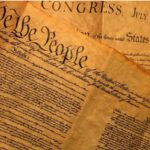
–>
May 27, 2023
Universities are forums for the free exchange of ideas, for learning how to think, not what to think; for debate, not indoctrination. Unfortunately, that can no longer be said of American universities. Open inquiry and critical thinking untainted by ideology have been supplanted by leftist dogma, including Critical Race Theory and social justice advocacy. Except at the increasingly rare institution offering a classical liberal arts education, it has become impossible for impressionable students to earn a degree without becoming steeped in leftist rhetoric and the extreme ideas of race and gender. They end up believing that America was built on racism and defining themselves as either oppressors or victims.
‘); googletag.cmd.push(function () { googletag.display(‘div-gpt-ad-1609268089992-0’); }); document.write(”); googletag.cmd.push(function() { googletag.pubads().addEventListener(‘slotRenderEnded’, function(event) { if (event.slot.getSlotElementId() == “div-hre-Americanthinker—New-3028”) { googletag.display(“div-hre-Americanthinker—New-3028”); } }); }); }
These ideological intrusions were insidiously mainstreamed from the seventies onward, especially in the humanities departments, by gradually building an ecosystem fostering faculty members who are left-leaning and sidelining those who are not. Universities are now taking this to the next level by precluding the recruitment of independent thinkers and conservatives. They are requiring prospective faculty to submit a loyalty oath to the tenets of diversity, inclusion, and equity (DIE; sometimes DEI) as a de facto litmus test of their political affiliation.
Examples abound of universities where DIE statements are a prerequisite for consideration for any job. At Arizona’s public universities, they are a standard feature of the hiring process for all faculty, professional, and staff positions. Some institutions in the state require prospective candidates to demonstrate their allegiance to DIE ideology even before a review of their qualifications takes place. At the University of Washington, support for DIE principles is de rigueur, and faculty applicants must justify their commitment by describing their past actions and explaining how they will continue to pursue DIE goals if appointed. The University of Pennsylvania website gives applicants guidelines for composing effective DIE statements. And at all campuses of the University of California (U.C.), faculty applicants must submit DIE statements that will determine if they merit consideration, regardless of their academic credentials or their teaching and research plans. From their statements, applicants are evaluated for DIE awareness and experience and their plans for advancing DIE on campus. They must agree to treat individuals differently based on their race, sex, and gender identity.
One highly qualified applicant at the University of California Santa Cruz (UCSC) is determined to expose the tyranny of “compelled speech,” not to mention its hypocrisy. John D. Haltigan, a former assistant professor at the University of Toronto, has applied for a tenure-track position at the university’s psychology department but knows well he will not be selected because he refuses to profess beliefs he does not agree with. The university’s guidelines for a passable DIE statement include acceptance and endorsement of political and ideological perspectives without even a concessive acknowledgment of their controversial nature and the uncertainties surrounding them.
‘); googletag.cmd.push(function () { googletag.display(‘div-gpt-ad-1609270365559-0’); }); document.write(”); googletag.cmd.push(function() { googletag.pubads().addEventListener(‘slotRenderEnded’, function(event) { if (event.slot.getSlotElementId() == “div-hre-Americanthinker—New-3035”) { googletag.display(“div-hre-Americanthinker—New-3035”); } }); }); }
Haltigan has posted his DIE statement for the job, titled “Against the Use of DEI Statements in Faculty Job Searches,” online. He begins by describing how his experience in the mental health field has made him deeply sensitive to the social and cultural factors that shape human development, how he is committed to “colorblind inclusivity, viewpoint diversity,” and “merit-based evaluation” and values “outreach to underrepresented groups.” Also, the statement insists, he is well positioned to carry out the university’s avowed mission. Thereafter, he affirmatively declares that DIE statements are an “anathema to the ideals and principles of rigorous scholarship” and the “sound practice of science and teaching.”
Haltigan is also suing the president, chancellor, psychology chair, and dean of social sciences of UCSC in federal court to seek an appointment based on his professional qualifications, not on a coerced pledge to uphold dogma he disagrees with. He is being represented by the pro bono law firm Pacific Legal Foundation (PLF), which is basing its case on the fact that demanding an acceptable DIE statement violates First Amendment rights: no individual can be compelled to say something he doesn’t want to or be kept from hearing or reading the words of others. Being required to waive the right to free expression for a job is unconstitutional and imposes a condition that has nothing to do with the professional qualifications required. Further, such a policy is discriminatory and violates the Fourteenth Amendment prohibition on racial quotas.
PLF is seeking the following from the court: a declaration that DIE statements violate the First Amendment, a preliminary injunction forbidding UCSC and the Board of Regents from enforcing it, a permanent injunction forbidding UCSC and the Board of Regents from using a DIE statement against their client, and coverage of all legal fees.
The capitulation to an ideological precept such as DIE is reminiscent of anti-communist loyalty oaths required in the 1950-60s, struck down by the Supreme Court. In the Keyishian v. Board of Regents of the University of the State of New York case of 1967, state laws requiring educators to sign loyalty oaths and refrain from “treasonable and seditious speech or acts” were deemed unconstitutional. The Supreme Court characterized the university classroom as “a marketplace of ideas” and ruled that the State University of New York (SUNY) could neither require faculty to sign an oath of loyalty as a condition of employment nor infringe applicants’ rights to free speech, assembly, and academic freedom.
Similarly, in Baggett v. Bullitt (1964), the high court ruled that employees’ First Amendment rights of association and speech had been violated by Washington state laws making employment contracts for teachers contingent on oaths of allegiance to the United States and vows of not advocating the overthrow of the government.
In Elfbrandt v. Russell (1966), the Supreme Court found that an oath to “defend the United States and Arizona against all enemies, foreign and domestic” and renounce political ideas that the state viewed as a threat to security was an infringement of the First Amendment’s guarantee of freedom of association.
‘); googletag.cmd.push(function () { googletag.display(‘div-gpt-ad-1609268078422-0’); }); document.write(”); googletag.cmd.push(function() { googletag.pubads().addEventListener(‘slotRenderEnded’, function(event) { if (event.slot.getSlotElementId() == “div-hre-Americanthinker—New-3027”) { googletag.display(“div-hre-Americanthinker—New-3027”); } }); }); } if (publir_show_ads) { document.write(“
And in Cole v. Richardson (1972), a case that overturned a Massachusetts statute requiring public employees to “uphold and defend” the U.S. and state constitutions, the court set conditions an oath must meet to be deemed constitutional. It was established that such an oath must not infringe on First and Fourteenth Amendment rights or be a condition for employment.
Clearly, leftist ideologies, and DIE doctrine enforcement in universities, have gone too far in the ivory tower of academia. Besides promoting tokenism, dishonesty, and the establishment of an ideological monoculture in a place where disparate views must compete and coexist, DIE statements are, as Haltigan says, “unethical” and “serve to preclude the very attributes they presume to enhance, instead creating censorious, divisive, polarizing, and otherwise inhospitable workplace cultures that are at odds with the core principles upon which public universities have been founded.”
The left has not spared even its own champions when they speak out against its unreasonable fiats. In 2017, biology professor Bret Weinstein, who describes himself as a left-libertarian, objected to a change to Evergreen State College’s annual “Day of Absence.” Diversity groups had insisted that instead of non-white people staying away to underline the diversity they bring, whites must remain off campus. In his email, Weinstein said that in the past, when minorities were absent, it was a “call to consciousness,” but prohibiting the presence of whites was a “show of force” and an “act of oppression.” He stayed on campus and was heckled and threatened by activists, who called for him to be fired. Weinstein and his wife, who also taught at Evergreen, quit their jobs, sued the college, and received a $500,000 settlement.
DIE ignores hard work and scholarship, but it is now one of the shibboleths of the left that faculty are forced to swear allegiance to. Viewpoint diversity, free expression, and academic freedom are under assault on the campus. A fight is long overdue. Hopefully, Haltigan’s lawsuit will be a first step in turning the tide.

Image: Pezibear via Pixabay, Pixabay License.
<!–
–>
<!– if(page_width_onload <= 479) { document.write("
“); googletag.cmd.push(function() { googletag.display(‘div-gpt-ad-1345489840937-4’); }); } –> If you experience technical problems, please write to [email protected]
FOLLOW US ON
<!–
–>
<!– _qoptions={ qacct:”p-9bKF-NgTuSFM6″ }; ![]() –> <!—-> <!– var addthis_share = { email_template: “new_template” } –>
–> <!—-> <!– var addthis_share = { email_template: “new_template” } –>




